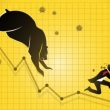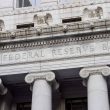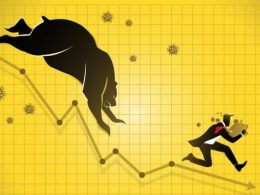Special to AdvisorAnalyst.com
We recently had a thought provoking conversation with Richard Heft, President and Co-Founder at EXT. Marketing in Toronto. We like talking to Richard as he as a uniquely qualified perspective on the entire Canadian investment industry, as one of the heads of what is arguably one of the best institutional communications consulting and production teams, now on both sides of the border. Along with EXT.'s co-founder, Jillian Bannister, Richard leads a group of communications and marketing experts working with North America's largest financial institutions.
They talk to just about everyone in the business about what's going on and all of the thought leadership that's occurring across the investment company ecosystem, and have a bird's eye view all that is happening, all of the opinions that are floating around, from all sides of the investment business.
Please enjoy our conversation and interview. This is part one of our conversation.
We will share part two of our conversation tomorrow, in which we discuss a multitude of ways advisors can step up their communications strategies with their clients in what is and has otherwise been a very difficult and challenging year and transition period, for all as investors.
AA: What are your thoughts on inflation?
It has been a crazy year. There's a lot going on out there, a lot of uncertainty and I think that 2023 is shaping up to be a very interesting year. I think we may have a little bit more pain before we start feeling a little better and we've rounded a corner, I don't know when that will be. I think we have a little while longer before we hit rock bottom.
It did seem like we were all aware of inflation well before the interest rates started rising and tapering began. It does feel to me like all the central banks could have moved a little bit earlier when the signs of inflation started to arise. I think they wanted to keep the economy humming by keeping interest rates low for as long as they could.
They kept saying it was transitory last year. It turned out to not be transitory at all. It was just the early innings of the ball game. The inflation in the US, which is clearly tied to supply chain disruptions that occurred late last year, earlier this year, and are still arguably occurring, and what's going on in Europe, is really tied to an energy crisis, in addition.
I don't think you can dismiss the fact that Europe is going into a very cold winter right now. I think that a lot of what we're seeing over there will have an impact in North America, nor is what's going on in North America impacting Europe quite as much. We may see more of a divergence between the two economic regions.
AA: ESG?
Europe's been way ahead of North America and the US was way ahead of Canada. So we’ve always been a bit behind the curve on the ESG story, the benefits and all of those things. ESG is environmental, social and governance. It's never been just environmental funds. There were other factors that go into Morningstar Sustainalytics and other rating services in terms of the social and governance.
It wasn't historically just about cleaning up the planet, it was also about performance. How do you garner performance based on a company's governance? It always goes into discussion. The S and the G are dropped off, which I think does a disservice to the story in its entirety. I would love to hear more stories about companies.
Reputation is super important.
ESG is another screen. Portfolio managers and algorithms use different screens. Sustainalytics is another screen, so you could put that overlay on and pay for it and, you know, it could drive up MERs, but who cares? Maybe your performance will be better. Maybe more clients will come to you because they do see you as caring about similar values to theirs. The G can impact stock or stock prices. We also know that on the S side, diversity has been shown to improve company performance.
Even if you talk about the [S]ocial, I think study after study that we've seen show that you have 50% women on your board and in your in senior leadership, your company is going to do better. It doesn't make the news as much, but it has to be ingrained as part of every company’s overall corporate planning to make gender diversity a massive part of their corporate psyche and action. Otherwise they're also missing another opportunity to build a a better brand.
AA: Why are financial advisors so ambivalent towards ESG?
There probably isn’t enough communication from screening tool manufacturers, to properly educate on what's being done, how it's being done, how it's benefiting the client, how it's benefiting the advisor and how they build their business. It feels like since COVID-19 occurred, the products have proliferated to the point of almost feeling a little maybe foisted on advisors, and their clients are asking. I think there may be a bit of a disconnect. I imagine it's similar to when ETF liquid alternatives and mutual funds, all of these new sort of products and investment approaches came about. Advisors probably need a little time to create a story that works for them and their clients and their business; how to talk about the advantages, talk about why they're introducing their clients to these new investment approaches. If I was an advisor, I'd be looking for, for more communications, for more discussion points. “This is A to Z. This is what you need to know.” This is how you can round out the narrative. Maybe the work wasn't done because people weren't able to sit together and it's harder doing it via Zoom. I think that might be why advisors haven't fully embraced it. There may even be a historic sort of hesitation based on the skepticism that it doesn't really contribute to performance.
Advisors are judged by their clients. Of course, every client wants to say, “I want my investment and my portfolio to echo my values.” It's a whole other thing when they say, “But it's down 15% last year, Why is it down 15%?” It’'s not as easy for the advisor to say, “Well, you told me you wanted all ESG.” That is the disconnect. I think it's going to get harder with markets as volatile as they have been in the past.
Copyright © AdvisorAnalyst.com















